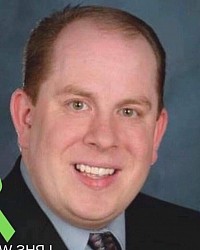LPHS Warriors
Meet fellow LPHS patients and read about their journeys from onset of symptoms to diagnosis and beyond.
Lisa - Newark, DE
Michael - Bristol, CT
“My life changed due to LPHS in 2012. One evening in June 2012, I was awakened by a sudden pain in my left flank area. This pain was so severe it brought me to my knees and I was hugging the toilet throwing up violently as a result of the pain. Initially, I called a friend for a ride to the ER and realized, as soon as I called that friend, I couldn’t wait for her and called 911. At the hospital after several hours of tests, the doctor suspected I had a kidney stone that I passed prior to the Ct scan and that I’d be fine in a few days. He sent me home with a script for Percocet and he was right I was back to normal in a few days. What I did know was I had never felt pain that severe before in my life.
Over the course of the next 6 months, this same scenario would play out multiple times. Often times with the same nurses and doctors. I had been there so many times I was getting to know the staff personally and professionally. What nurses had kids, who was taking classes, who had a sick child, etc.
After about 6 months, I met a physician that I now call the barracuda doctor. I will never forget that night. I was escorted to a stretcher that was in the hall of the ER. The place was packed. A female doctor that I had never met before came up to me and, in front of everyone, stated “what are you here for”? I explained my story and she looked up and very firmly stated “I think you’re drug seeking and you are not getting any pain medicine from me tonight”. I was taken back. She had caught me off guard. This was the first time I heard the term drug seeker. I went home and was in so much pain I had no idea what to do. The next morning, I called my PCP and was able to get in to see him. When we met, I explained what happened the evening prior. He told me there was one way that we could put this to rest. We went into the bathroom and I gave him a supervised urine sample that looked like tomato juice with clots. He looked at me while looking at the sample and said “you can’t fake that!” He summoned an ambulance and had me sent to a larger hospital in the area where I was met by a nephrologist that he thought might be able to figure out what was going on. Over the next week, I was bombarded with labs, scans and procedures including a double kidney biopsy. At the end of the week as my pain was resolving, the nephrologist came into my room and said I think I know what you have. At this point I knew stones had been ruled out, so I had suspected cancer. The nephrologist said, “I think you have Loin Pain Hematuria Syndrome”. He explained what LPHS was and then said that he wasn’t qualified to diagnose me or treat me for that matter. He referred me to a nephrologist located at New York Presbyterian. He was supposedly some guru on LPHS who had done studies and been published. This is only where the real adventure began.
Over the course of the next several months, I attempted to make appointments to see the doc in NYC. I had to jump through hoops and basically had to ask the original nephrologist to reach out to him because this doc was just so busy I could barely get past the staff answering the phones. Part of the issue was I had State of CT Medicaid. Once I had an appointment, I learned that Medicaid would not pay for me to see a specialist out of state. They referred me to a nephrologist at Yale New Haven Hospital. After several appointments that were cancelled and rescheduled by the doctor, I was able to get into see him. He had asked for a urine sample when I arrived. After providing the sample, I was brought to an exam room where he entered with a resident and introduced himself as being the chief nephrologist in charge of the entire renal department. He showed me several microscope slides on his phone and showed me a red blood cell and crystals in my urine. He described the red blood cells as being cast cells and along with the crystal would be impossible to fake. It’s been just over a year now and I’m thinking back to that night in the ER. For once, I’m feeling vindicated but then came the other foot. He told me he had never met a patient with LPHS and thus never treated one but he was the head of nephrology at Yale and therefore a real smart guy. He told me he could read about LPHS and learn how to treat me. All of a sudden, I had a pit in the bottom of my stomach. I went back to my PCP and begged him to find a way to get me in to see the doc in NYC.
Over the course of the next year, my doc wrote multiple letters to Medicaid explaining LPHS and it’s rarity. He explained that it would be best that I see the doc in NYC. After about a year, I was finally approved to see the guru in NYC. I excitedly called to make the appointment, only to be told he was now not accepting new patients. At this point it had been almost two years since that first night I woke up in pain. My doc told me he would write the doc in NYC and explain my situation. Keep in mind, during this entire time I am in and out of the hospital with multiple admissions for pain control. For a number of months, multiple emails and letters from my PCP went unanswered. Finally my doc was able to get the guru on the phone and he agreed to see me. I was over the moon. I had been bouncing in and out of the hospital. Sometimes it was necessary for me to go to several different hospitals to get treated, especially as the opiate epidemic grew. I had oral medication but once the nausea set in I’d have to be admitted for IV pain control. I look back now at the number of hospitals I went to because I was in so much pain. I just wanted treatment and I think that on paper it must have looked awful and screamed drug seeker.
I finally get to NYC to have the doc tell me that he has reviewed all the scans, labs and procedures and agrees with the diagnosis of LPHS. As I sit here I think, great, finally some progress and someone who knows how to treat me. I quickly was told that the best thing for me would be an AT (Renal Autotransplant). I was shocked. Fifteen minutes prior to meeting this guy, no one knew how to treat me and now I have a doc looking to relocate my kidney after denervating it. I told him I needed to discuss it with my PCP and family. I drove the hour back to Connecticut with that feeling in my stomach. I got home and decided to do some more research on LPHS and the AT. At the same time, I came across the groups on FB for those suffering with LPHS. After joining and asking where everyone was getting their treatment, I learned of another doctor who had multiple LPHS patients in Massachusetts. This was a little closer and, because he was right over the state line in Springfield, his office recognized CT Medicaid. I met with the doc in MA and learned he had 33 patients from the area and many who were out of state. At this point, I have probably been suffering with LPHS 3-4 years. I decided that I was going to use the doc in Massachusetts first. The primary reason being, the AT would be the last resort. Over the course of the next two years, we tried multiple medications, combinations of meds and different delivery systems for the meds. (from oral, IV, IM etc.) This went on for two years and I was only getting worse. I was practically living in the hospital, averaging 50-60 admissions per year. Sometimes, this was due to just pain but often times I had a UTI. It was finally decided that I would have the AT in January 2017. The surgery was done with no issues. After recovering, the only way to find out if it was successful was to stop the narcotics and see what happens. My PCP started to ween me off the meds and I was miserable from the withdrawal. I asked him to find me a detox bed where I signed in for 10 days. After discharge, I was off the narcotics for 4-5 months and pain free. Felt like I had my life back. In May/June 2017, the pain returned. Doc told me they often saw pain return at the 4-5 month mark as a result of some nerves regenerating. The AT did help some and, to date, I average about 1 admission every 4-5 weeks for pain control, UTIs, Sepsis, or a combo of all three. Doc tells me they did not know then what they know now and need to go back in and denervate the ureter and shorten it. This should then resolve the remains of my pain.
Over the years from 2012 to present, I learned several important things. No one will advocate for you other than you. Docs often times will decide upon a course of treatment for you without your input. This is a huge pet peeve of mine. I often say, “Don’t you think I’d want a say about the course of treatment?” Do not be scared to challenge the doctor while in the hospital. You most likely will know more about LPHS. Today I have an established care plan at my local hospital. It is in writing and has my doctor’s cell phone number. The ER doc calling the doc on call will not help you. Most times the on call doc doesn’t know you or LPHS. Be aware of docs who don’t know anything about LPHS. They are easy to spot because they want nothing to do with you and will often rush to send you home, doing everything and anything to get you out the door, including transferring you to another facility. I’ve gone through 3 nephrologists, 3 PCPs, 6 Pain docs and at this point, my nephrologist was so frustrated that the pain doc was ignoring his recommendations, so I terminated my relationship with them and my nephrologist writes for my narcotics. Lastly, my advice is to not settle. You know your body. It took me several years of getting the team I have now. If you’re not happy don’t be scared to have a conversation with the doctor. After all, they work for you.”


